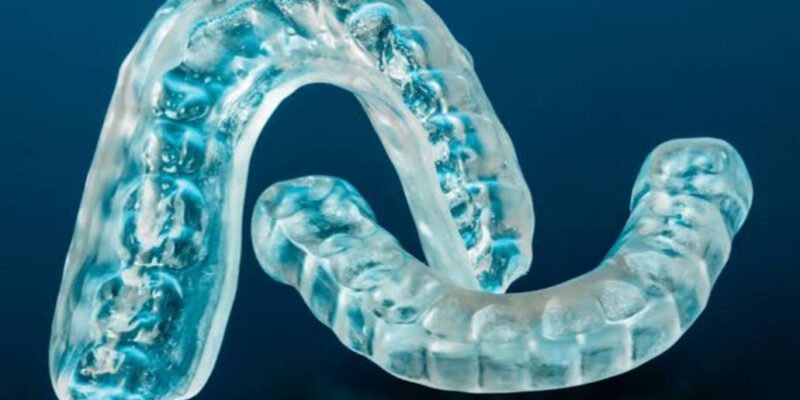Abstract
This clinical research was done on patients who were referred to the clinic by ENT specialists, for the treatment of temporomandibular joint disorders. Total of 8 patients who had complaints of bruxism & tinnitus were taken into account for this clinical research. Tinnitus was resolved using mouthguard and medication, both within the scope of dental surgeons. Thus, this article provides a new understanding that tinnitus due to temporomandibular joint disorders can be treated by dental surgeons.
Introduction
Tinnitus refers to the perception of hearing sounds such as ringing, buzzing, hissing, chirping, whistling or other noises in the ears. The sounds can occur sporadically or persistently and may have varying degrees of loudness.
It is often worse when background noise is low, so the patient may be most aware of it at night when they’re trying to fall asleep in a quiet room. It maybe associated with hearing loss, although it does not cause it.
The primary cause of tinnitus is often attributed to prolonged exposure to loud sounds, which can result in permanent damage to the sound-sensitive cells located in the cochlea of the inner ear. However, there are also other conditions and illnesses that may contribute to the development of tinnitus. These include:
- Natural aging process
- Blockages of the ear due to a buildup of wax, an ear infection, or rarely, a benign tumor of the auditory nerve.
- Certain drugs like aspirin, several types of antibiotics, anti-inflammatories, loop diuretics, and antidepressants, as well as quinine medications.
- Meniere’s disease
- Otosclerosis
- Other medical conditions such as high blood pressure, cardiovascular disease, circulatory problems, anemia, allergies, hypothyroidism, autoimmune disease, and diabetes
- Head and neck injuries and
- Temporomandibular joint (TMJ) disorders.
The treatment of tinnitus due to TMJ Disorders involves mouthgaurds and certain drugs such as paroxetine 20 mg. Both these treatment modalities are within the scope of dental surgeons. Thus, this article provides a new understanding that tinnitus due to temporomandibular joint disorders can be treated by dental surgeons.
Case Report
This clinical research was done on patients who were referred to the clinic by ENT specialists, for the treatment of TMJ disorders. Total of 8 patients who had complaints of bruxism & tinnitus, were taken into account for this clinical research. An X ray of TMJ (both opening & closed) was advised. X-ray reports confirmed that the patients were suffering from different types of TMJ disorders.
The treatment prescribed was use of bite & boil mouth protector mouthguards at night for 6 weeks. Mouthguards prevent bruxism which causes muscle pain and tension, and help to stabilise the TMJ. Out of 8 patients, 4 patients said that by the end of 3rd week, the problem of bruxism & tinnitus started to cease but the patients did feel some sort of pain. To get rid of this, the patients were prescribed Etrocoxib MR(muscle relaxants). They were relieved of pain.
The other 4 patients said that the problem of tinnitus was still there even after using mouthgaurds for 3 weeks with no relief. For these patients, a drug called Paroxetine 20 mg was prescribed to be taken at bed time (after dinner in OD dose) for 3 weeks. Although this drug is primarily an anti-depressant, it increases the activity of tongue muscle genioglossus, which is important for the tongue’s stable positioning. The affected patients were asked to continue using mouthguards for 3 more weeks. At the end of 6th week, these 4 patients too got relief from tinnitus due to TMJ disorders.
It must be mentioned that though all the patients got relieved from tinnitus due to TMJ disorders, they did show other signs & symptoms of TMJ disorders for which they were recommended physiotherapy.
Discussion
A total of 8 patients were taken into account for this clinical research, who had complaints of bruxism & tinnitus. Tinnitus was resolved using mouthguard and medication, both within the scope of dental surgeons.
The X-ray view advised for TMJ was axiolateral view. The details of the radiographic view were as follows:
- Central ray 25-30 degree caudad, centred 5 cm superior & 1 cm anterior to the external auditory meatus.
- Collimation: No more than 10 x 10 cm with TMJ & area of external auditory meatus of interest.
- Orientation: Portrait
- Detector Size: 18 cm x 24 cm
- Exposure: 70-75 kVp; 16-25 mAs
- SID: 100 cm
- Grid: Yes
Mouthguards prevent bruxism which causes muscle pain and tension, and help to stabilise the TMJ. This inturn, may stabilize a misaligned eardrum too and reduce ear symptoms (tinnitus) caused by TMJ disorders. The mouthguards prescribed were bite & boil mouth protector mouthguards as these are easily available in the market. The usual custom fitted mouthguards which are made in dental labs were not advised, as the fabrication of these type of mouthguards take time and the patients were all urgent referrals from ENT surgeons. Bite & boil mouth protector mouthgaurds are made of thermoplastic material and are placed in hot water to soften, then placed in mouth & shaped around the teeth using finger & tongue pressure.

The drugs prescribed were:
1. Etoricoxib MR. Etoricoxib is a selective COX-2 inhibitor used to relieve moderate post-surgical dental pain as a short-term treatment and inflammatory and painful symptoms of various forms of arthritis. It’s muscle relaxant effect took care of pain due to any acute muscle tension or minor gingival injuries caused by the mouthguard.
2. Paroxetine 20 mg. Paroxetine 20 mg is primarily an anti depressant. It increases the activity of genioglossus muscle. Genioglossus is considered as the safety muscle of tongue. Stable positioning of tongue is very necessary to control bruxism & it is the genioglossus muscle which maintains the stable position of tongue and advances the tongue. Paroxetine 20 mg prevents the tongue to collapse posteriorly overtime as genioglossus weakens with age.

Pain reducing ear drops are generally prescribed for tinnitus but should be avoided as first line of treatment for tinnitus due to TMJ as it makes the treatment more confusing without giving any good prognosis in the end.They may cause allergic reactions in the ear which can complicate the prognosis of the temporomandibular joint disorder treatment and hence must be avoided. In addition, it has been found that some pain reducing ear drop may cause a blood disorder named methemoglobinemia in rare cases.
Conclusion
From the above clinical research, it can be concluded that to relieve patients from tinnitus due to TMJ, use of mouthguards for 6 weeks along with a muscle relaxant is an appropriate treatment approach. After 3rd week, if patient is not relieved from tinnitus, then the drug Paroxetine 20 mg can be given along with the use of mouthguards at night. Thus, the new understanding is that for tinnitus due to TMJ, mouthguards can be considered as the first line of treatment and drug paroxetine 20 mg along with mouthguards as the second line of treatment (within the limitations of a small sample size). Use of mouthgaurds is the best non surgical option for treating tinnitus due to TMJ Disorders, as mouthgaurds helps to stabilize the TMJ and probably a misaligned eardrum too.
Limitation:
The limitation of this research is that only 8 people were taken into count. To come to a strong conclusion, that to treat tinnitus due to TMJ, first line of treatment can be Mouth guards and second line of treatment can be drug paroxetine 20 mg along with mouthguard, we need to increase the sample size.
Author:
Dr Mriganka Sekhar Ghose;BDS(Gwl) ;Paed Dent Spclty Prog(Royal College Of Surgeons Ireland), Cert in Evidence Based Medicine(PGI Chandigarh).
FAQs
Can a mouth guard help with tinnitus?
Yes, a mouth guard can help with tinnitus caused by teeth grinding or clenching, as it can alleviate the pressure on the jaw and reduce the tension in the muscles that can lead to tinnitus.
Can bruxism cause tinnitus?
Yes, bruxism, or teeth grinding, can cause tinnitus due to the pressure and tension it puts on the jaw muscles, which can affect the ears and cause ringing or other sounds.
Can TMD cause tinnitus?
Yes, TMD or temporomandibular joint disorder can cause tinnitus, as it can affect the muscles and nerves in the jaw and neck, which can lead to ear problems and ringing.
Can clenching teeth cause tinnitus?
Yes, clenching teeth can cause tinnitus due to the tension and pressure it puts on the jaw and muscles, which can affect the ears and lead to ringing or other sounds.
How can a dentist help with tinnitus?
A dentist can help with tinnitus by identifying any dental issues that may be contributing to the condition, such as bruxism or TMJ, and recommending treatment options, such as a mouth guard or dental splint.
Can tinnitus caused by TMJ be cured?
Tinnitus caused by TMJ can be managed and sometimes resolved by treating the underlying TMJ condition through techniques such as physical therapy, medication, or surgery.
Does teeth grinding cause ear ringing?
Yes, teeth grinding can cause ear ringing due to the tension and pressure it puts on the jaw and muscles, which can affect the ears and lead to ringing or other sounds.
Can chewing gum help tinnitus?
Chewing gum may provide some relief for tinnitus in some cases by helping to alleviate tension and pressure in the jaw muscles, but it is not a proven treatment for the condition.
Can bruxism affect VA disability ratings?
Yes, bruxism can affect VA disability ratings if it is considered a service-connected condition that is causing or contributing to other health problems, such as tinnitus or TMJ.
Reference:
https://www.ncbi.nlm.nih.gov/pmc/articles/PMC6736614
https://www.webmd.com/a-to-z-guides/understanding-tinnitus-basics
https://caringmedical.com/prolotherapy-news/tmj-tinnitus
https://pubmed.ncbi.nlm.nih.gov/10617169/





















Comments